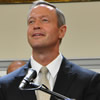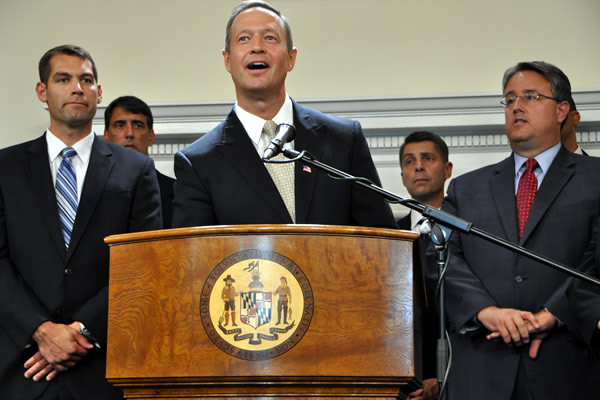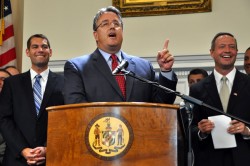Local
O’Malley backs 2012 push for marriage equality
Bill becomes part of guv’s legislative package

ANNAPOLIS, Md. — Flanked by lawmakers and members of a broad coalition of Maryland LGBT leaders, Gov. Martin O’Malley today announced that a law legalizing same-sex marriage would be part of his 2012 legislative package.
After a disappointing 2011 session for marriage equality advocates in Maryland, ending with the death of a Senate-passed marriage bill in the lower house, the governor came out in favor of a bill that he said would address “religious freedom and protect marital equality rights equally under the law.”
O’Malley’s press conference today signals that he may take a more active role in leading on marriage equality legislation. He was criticized earlier this year for not taking a more visible role in support of the 2011 bill.
“I’m supportive of this bill in the upcoming session, and so supportive that I’ve decided to make it one of the handful of bills that will be an administrative priority.”
When asked by a reporter if his own views on marriage equality had changed, the governor said, “I have always believed in the dignity of every individual. I believe in our own responsibility to advance the greater good. And I also understand that there is a unity of the spirit and matter, and that what we do in our own lifetimes does matter.”
He continued, “As a free and and diverse people of many faiths, we choose to be governed under the law … governed by certain principles and beliefs. Among them, equal protection of the law for every individual and the free exercise of religion free of interference from government. Other states have found a way to protect both of these fundamental beliefs. Therefore in the 2012 legislative session I will sponsor legislation that protects religious freedom and protects marital equality rights equally under the law.”
“I was raised to understand that there are certain things that churches and religions dispense, and that the government should not interfere with defining those,” the governor said when asked about his own evolution on marriage, after previously favoring civil unions rather than full marriage equality. “That’s what we seek to protect, both of those freedoms, that is equality under the law in terms of rights conferred.”
While taking questions, O’Malley emphasized that while he supported civil unions in the past, he’s always believed in equal protection under the law.
“The difficulty that we face as a diverse people was how to enforce a consensus that will protect rights equally under the law,” he said, “the development of that consensus, the ability to come together around marital equality is something that I think is one of the faster moving issues of opinion that we’ve seen in our country for some time.”
He also brought up the victory for marriage equality in New York, and noted that process will influence strategy in Maryland as well.
“Each state learns from the other states,” the governor said. “I would like to think that in New York, they learned from our experience, and we will learn from their experience.”
He continued, “New York showed you could protect religious freedom and you can protect protect rights equally and that’s what we’re going to do with this bill.”
When asked about the influence the momentum from New York had on his decision to hold today’s press conference, O’Malley said the bill’s prospects are stronger because the coalition pushing the bill is much better developed.
“I think the broad nature of this coalition is something I’m very much encouraged by and by the success in New York. It is a fundamental truth that with every accomplishment, further accomplishments appear possible. When New York was able to bring people together—and do it by the way, in a bi-partisan way—and were able to bring into their coalition… a number of religious leaders.” He said, “We still have a lot to do, and this coalition is important, and this is the way to get it done, and certainly New York’s success in accomplishing the marital equality bill in New York was something encouraging to everyone, including myself.”
There had been some speculation within the Maryland LGBT community that a second chance for a 2011 success may surface in the state’s October special session for redistricting, but the governor was quick to dismiss that strategy.
“I think most of us are focused on the upcoming regular session, and I think that time will be well used to broaden this coaltion,” O’Malley said.
When asked what he thought about the possibility of opponents of marriage equality bringing a referendum to the ballot undoing any new law, O’Malley said, “It’s their right under the laws,” but added that he is focused on getting the law passed by a broad coalition of leaders from throughout the civil rights and religious communities so that such efforts would not gain traction.
“I’m very optimistic that if all of us work hard and all of us stay focused on the important principles at stake here, which are freedom of religion and also equal protection under the law,” he continued, “that we can pull together the necessary votes for passage.”
“We know that we have work to do, because it did not work the last time, and that’s why we’re here today. To commit ourselves to that work.”
During the press conference, several lawmakers took the podium to emphasize the size and scope of the new coalition to pass a bill legalizing same-sex marriage in the Free State.
“Many during the past session said this was not a civil rights issue,” said Sen. Robert J. Garagiola, (D-Montgomery Co). “I don’t see how you can’t look at it as a civil rights issue. You just look at our history—American history, Maryland history—we had laws on the books that discriminated between different races, and right now we have laws on the books that discriminate between two loving people. To me it’s the same exact thing.”
“We had a little bit of courage from one Republican in the Maryland Senate, Allan Kittleman,” the senator continued. “To me this is an issue where Democrats and Republicans should come together.”
“The governor is saying this is what’s right,” said Del. Benjamin Barnes (D-Anne Arundel & Prince George’s County). “We’re a nation founded on equality, and when you deny certain individuals their rights under marriage, you deny them certain fundamental equal rights. This governor is saying this is not just, and we’re going to have equality in the state of Maryland.”
Ezekiel Jackson of the Servicemembers Employee International Union local 1199 of Maryland and the District of Columbia was also on hand to announce the union’s involvement with the coalition taking the lead on passing marriage in 2012. Jackson claims SEIU’s membership on the coalition makes sense because families should not have to leave the state of Maryland in order to get married and take advantage of the benefits marriage affords.
“Anytime we look at a situation where residents are spending money outside of Maryland, we rush to find ways to keep that money in Maryland,” Jackson said. “Why can’t we do the same thing with families?”
Many members of the Maryland LGBT Caucus were on hand to praise the governor as well, including Sen. Richard S. Madaleno Jr. (D-Montgomery County), and Del. Maggie McIntosh.
The only openly gay member of the Senate, Madaleno enthusiastically took the microphone to praise O’Malley for pledging to lead in passing marriage equality in Maryland.
“This is probably going to be the second most exciting moment that I have had in this room,” Sen. Madaleno said. “And it will only be surpassed by the moment within the next nine months that we will stand here, with [the governor], pen in hand, to sign into law the marriage equality bill.”
“Maryland, in history, is the seventh state in the union to have embraced the Constitution,” Madaleno pointed out. “And in the next nine months, we will be the seventh state in this country to embrace marriage equality.”
Del. McIntosh, Maryland’s first openly gay lawmaker, and former majority leader, has known O’Malley throughout his political career, beginning with his time on the Baltimore City Council. “All of us in the legislature who are openly gay members would like to thank you for your leadership, Gov. O’Malley,” she said at the press conference. “Your sponsorship and your willingness to continue toward marriage equality in Maryland means so much to so many families in Maryland. So we’re going to win!”
When asked how the LGBT Caucus is mapping out its strategy with the governor and who has taken the lead, McIntosh told the Blade that, while the members of the LGBT Caucus have yet to meet with the governor over this bill, officially, she and Madaleno have been working with the governor’s chief legislative officer, Joe Bryce.
“Obviously Sen. Mandeleno and I have had conversations with the governor, and many of our colleagues have had conversations with the governor urging him to take the lead,” McIntosh said. “We will work with Joe Bryce going forward, probably looking at the New York law, looking at ours—ours was only two or three votes short—so is there something we can tweak. We have to all be on the same wavelength about that. But we will introduce a bill, and I think we will absolutely work with his office hand-in-hand to get the legislation passed.”
“We were working closely with members of the LGBT Caucus and other supporters of marriage equality last session earlier this year,” Marty Rouse, national field director for the Human Rights Campaign, told the Blade. “And now we work very closely with the GLBT delegates, and working with Progressive Maryland and others. If there’s a difference between earlier this year and today, it’s a much broader and deeper coalition. And now with the support of the governor, clearly we have a much better chance of getting this passed next session.”
Marylanders for Marriage Equality, a new group, announced last week a major coalition to begin a statewide effort to press for passage of a marriage equality bill in 2012. The coalition includes Progressive Maryland, 1199 Service Employees International Union, Communications Workers of America, American Federation of State, County Municipal Employees (AFSCME), American Civil Liberties Union of Maryland, Equality Maryland, the Human Rights Campaign, Pride in Faith, Maryland Black Family Alliance and Catholics for Equality.
Virginia
Walkinshaw wins Democratic primary in Va. 11th Congressional District
Special election winner will succeed Gerry Connolly

On Saturday, Fairfax County Supervisor James Walkinshaw won the Democratic primary for the special election that will determine who will represent Virginia’s 11th Congressional District.
The special election is being held following the death of the late Congressman Gerry Connolly, who represented the district from 2008 until 2024, when he announced his retirement, and subsequently passed away from cancer in May.
Walkinshaw is not unknown to Virginia’s 11th District — he has served on the Fairfax County Board of Supervisors since 2020 and had served as Connolly’s chief of staff from 2009 to 2019. Before he passed away, Connolly had endorsed Walkinshaw to take his place, claiming that choosing Walkinshaw to be his chief of staff was “one of the best decisions I ever made.”
The Democratic nominee has run his campaign on mitigating Trump’s “dangerous” agenda of dismantling the federal bureaucracy, which in the district is a major issue as many of the district’s residents are federal employees and contractors.
“I’m honored and humbled to have earned the Democratic nomination for the district I’ve spent my career serving,” Walkinshaw said on X. “This victory was powered by neighbors, volunteers, and supporters who believe in protecting our democracy, defending our freedoms, and delivering for working families.”
In addition to protecting federal workers, Walkinshaw has a long list of progressive priorities — some of which include creating affordable housing, reducing gun violence, expanding immigrant protections, and “advancing equality for all” by adding sexual orientation and gender identity to the Fair Housing Act.
Various democratic PACs contributed more than $2 million to Walkinshaw’s ad campaigns, much of which touted his connection to Connolly.
Walkinshaw will face Republican Stewart Whitson in the special election in September, where he is the likely favorite to win.
Maryland
LGBTQ suicide prevention hotline option is going away. Here’s where else to go in Md.
Changes will take effect July 17

By ANNA RUBENSTEIN | The national suicide prevention hotline will no longer offer specialized support to LGBTQ people, starting July 17, the Trump administration announced last week.
Dialing the hotline at 988 will still be available for crisis support. But callers will no longer be able to reach specific LGBTQ services by pressing Option 3. The change worries advocates because their data shows the LGBTQ community has a disproportionally high suicide rate.
Even after the option ends, here’s how to receive tailored support if you’re in Maryland.
The rest of this article can be found on the Baltimore Banner’s website.
Maryland
Silver Spring holds annual Pride In The Plaza
‘Today means inclusion. It means to build resilience’

Silver Spring’s annual Pride in the Plaza event took place on Sunday to celebrate the LGBTQ community and emphasize inclusion and resilience.
“Today means inclusion. It means to build resilience, love,” Robyn Woods, program and outreach director for Live In Your Truth, which organized the event, said. “I mean, just being surrounded by the community and so many great entrepreneurs, business owners, and just being a part of this whole rainbow coalition that we call the LGBTQIA to be about.”
With the event being her first time organizing for Live In Your Truth, Woods said she felt emotional to see the support and love at the event.
“Some people (are) bringing out their children, their babies, their grandparents,” Woods said. “It’s a lot more allies here than anything else. That type of support to me means so much more than just support from my community; just outside support, inside support, so much support around it, so much love. Everyone’s smiling outside, helping each other.”
Attendees of the event were able to head over to the Family Fun Zone, an air-conditioned Pride Cool Down Lounge, or watch live drag performances in the main stage area.
Along with entertainment and a shaved-ice stand, rows of information tables stood along the plaza, including FreeState Justice, the Washington Spirit, Trans Maryland, Moco Pride Center, and the Heartwood Program, an organization that offers support, therapy, education, and resources to the LGBTQ community.
“I want people to know about our services, and I love what we have to offer,” Jessica Simon, psychotherapist for Heartwood Program’s Gender Wellness Clinic, said. “I (also) want to be part of a celebration with the community, and so it feels good to be here with other people who have something they want to give to the community.”
She added that within today’s political climate, to which she called an “antidote to shame,” it’s important to be celebrating Pride.
“There’s a lot of demonization of LGBTQI people,” Siena Iacuvazzi, facilitator for Maryland Trans Unity, said. “(Pride) is part of the healing process.”
Iacuvazzi said she was taught to be ashamed of who she was growing up, but being a part of a community helped her flourish in the future.
“I was taught how to hate myself. I was taught that I was an abomination to God,” she said. “But being a community is like understanding that there are people who have experienced the same thing, and they’re flourishing. They’re flourishing because they’re willing to stand up for themselves as human beings and discover themselves and understand what’s true for themselves.”
She added that Pride allows for a mutual understanding to take place.
“It’s more of a sense of belonging … and just taking that home and understanding you’re not alone,” Iacuvazzi said. “We’re each taking our own journey — we’re not putting that on each other. It’s just walking away with a sense of belonging and humanity.”
Similar to Iacuvazzi, Woods said she hopes attendees’ biggest takeaways would be family, fun, resilience, and pride.
“Being proud of yourself, being happy for who you are, and representation and how much it matters,” she continued. “And I think all these young people that are walking around here get to see versions of themselves, but older. They get to see so many different lesbian, gay, bisexual, pansexual people that are successful, that are showing love, that care, and it’s not how we’re portrayed in the media. It’s lovely to see it out here. (It’s) like we’re one big old, happy family.”
-

 U.S. Supreme Court5 days ago
U.S. Supreme Court5 days agoSupreme Court upholds ACA rule that makes PrEP, other preventative care free
-

 U.S. Supreme Court5 days ago
U.S. Supreme Court5 days agoSupreme Court rules parents must have option to opt children out of LGBTQ-specific lessons
-

 Television5 days ago
Television5 days ago‘White Lotus,’ ‘Severance,’ ‘Andor’ lead Dorian TV Awards noms
-

 Music & Concerts5 days ago
Music & Concerts5 days agoBerkshire Choral to commemorate Matthew Shepard’s life













